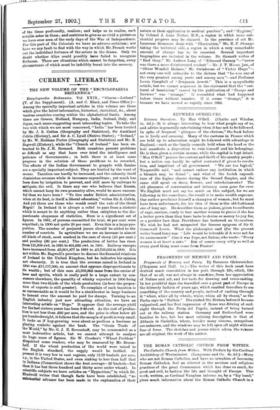BETWEEN OURSELVES.
Between Ourselves. By Max O'Rell. (Chatto and Windier. 3s. 6d.)—It is always interesting to hear what people say of us, and advice is generally entertaining when it has not to be followed. In spite of frequent " glimpses of the obvious," the book before us is lively and amusing Many of the customs in France which are held up to admiration might be followed with advantage in England,—such as the family councils held when the head or the heir manifests a disposition to ruin himself and his belongings. He is then given a certain income, while the capital is kept intact. " Max O'Rell " praises the content and thrift of his country people ; but a nation can hardly be called contented if given to revolu- tion, and impatient of all government. " We are too logical," Tocqueville said, "and cannot endure any institution in which a blemish may be found " ; and what of the lavish expendi- ture of the higher classes during the Second Empire, and the sums still spent on dress, flowers, and entertainments P The old pleasures of conversation and intimacy seem gone for ever. We English must not say too much on this subject, for we are following in the same lines; the result is to make wealth supreme. Our author proclaims himself a champion of women ; but he must have been unfortunate, for his idea of them is the old-fashioned one of long ago. He describes them as jealous, given to outbursts of rage, envious, ready to tear another woman to pieces if she has a better gown than they have taste to devise or money to pay for, or a prettier face than Providence has bestowed on themselves. We wish he had not misquoted the famous epigram of Sir G. Cornwall Lewis. What the philosopher said (for the present writer heard him) was: " Life would be tolerable if it were notfor its amusements." Also it was Pope, not Balzac,who wrote : "Every woman is at heart a rake." But of course every witty as well as every good thing must come from France!










































 Previous page
Previous page